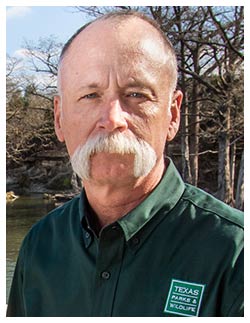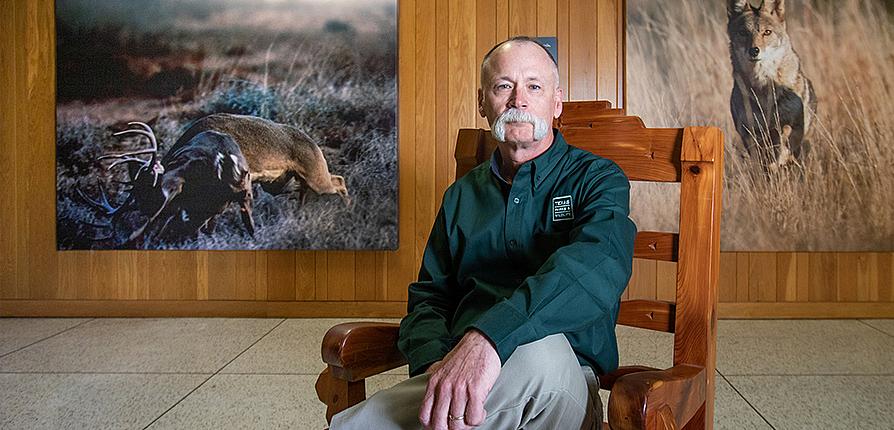Alumnus holds key leadership position with the Texas Parks and Wildlife Department
Story by Sarah Fuller '08 & '13

Class of 1986
From the high mountains of the Chihuahuan Desert to the humid bottomlands of the piney woods ecoregion, Clayton Wolf '86 has dedicated his 30-plus-year career in natural resources management to conserving Texas' wildlife and wildlands. Now, as chief operating officer of the Texas Parks and Wildlife Department, he is responsible for the overall operation of a statewide agency that manages more than 770,000 acres of wildlife management areas and 600,000 acres of state parks, natural areas and historic sites.
Wolf, who graduated with a Bachelor of Science in Forestry from SFA, distinctly remembers key outdoor experiences that defined his childhood — hunting his first deer, catching his first fish and participating in family camping trips. It is his goal to provide similar outdoor experiences for all Texans.
"Integral to our conservation mission is engagement in the outdoors," Wolf said. "Whether it's camping, hunting, fishing, hiking or birdwatching, we are focused on enhancing public engagement with our natural resources."
As the landscape of Texas changes, growing in population and urbanization, this will be no simple task.
"It's not just conservation issues we face, but the growing detachment of society from the natural world," Wolf said. "If wildlife agencies or anyone in the conservation field is going to be successful in conserving the environment, the public has to believe in and support what we do."
With this in mind, the 10 agency divisions directed by Wolf have launched a number of new initiatives to invigorate interest in and expand access to the outdoors. These new initiatives join a diverse selection of established programming, such as the Texas Youth Hunting Program, which introduces young Texans to hunting safety and ethics; Texas Outdoor Family Workshops, which provide novice campers with basic outdoor skills; the Neighborhood Fishin' Program, which offers free fishing opportunities at city and county ponds; and Project Wildlife In Learning Design, known as Project WILD, which equips educators with curricula to teach wildlife-related concepts.
Wolf plans to ensure these opportunities for outdoor appreciation and recreation continue to grow during his tenure as COO.
Palo Pinto Mountain State Park, located 75 miles west of the Dallas/Fort Worth metroplex, is currently in development, and the recently opened Roger Fawcett Wildlife Management Area will not only provide recreational opportunities but also myriad possibilities for biological research.
Along the Texas Gulf Coast sits one of the state's newest wildlife management areas — the roughly 17,000-acre Powderhorn Ranch. A portion of this land also will eventually house a state park situated along the shore of Matagorda Bay and Powderhorn Lake.
"This acquisition is considered by most as one of the last great places along the Texas coast," Wolf said. "It was a big deal orchestrated with a lot of partners."
Wolf said this reliance on partnerships and healthy relationships with stakeholders is integral to success both in conservation and leadership.
"Any leader can navigate through the easy times when there's a healthy budget or no contentious issues, but it's during those difficult times when you need to have established good working relationships with other agencies, nongovernmental organizations and the private sector," Wolf said.
Wolf credits Dr. Monty Whiting, SFA professor emeritus of forestry, as being a key mentor, providing guidance and encouraging him to step out of his comfort zone in order to foster professional growth.
"He was an excellent student who worked hard, took leadership roles and continued to do so throughout his life to reach this point in his career," Whiting said.
Prior to his appointment as COO, Wolf served as the Texas Parks and Wildlife Department's statewide wildlife division director. This division, comprising top wildlife biologists and researchers, is responsible for navigating the intricate network of modern conservation issues and accompanying stakeholders, as well as implementing science-based initiatives to support Texas wildlife and public access to this resource. This includes restoring threatened and endangered species, improving habitat management on private lands, addressing the impact of exotic and invasive species, and implementing the Texas Conservation Action Plan.
During his time as wildlife division director, Wolf was asked to serve on the advisory council for SFA's Arthur Temple College of Forestry and Agriculture. The council, established in 2012, comprises a select group of accomplished professionals representing all disciplines within the college who dedicate their time, insight and expertise to enhancing the mission, academic rigor and success of the college.
"Since graduating from our forestry program, Clayton has been an outstanding role model and mentor for our forest wildlife management students," said Dr. Hans Williams, dean of SFA's Arthur Temple College of Forestry and Agriculture. "He is an engaged and valued advisor who exemplifies to our forestry students what it truly means to be a servant leader."
In addition to beginning his career at SFA, Wolf met his wife, Ashley '85, a fellow forestry student and champion for Wolf's journey as a wildlife biologist and conservation leader.
"She has supported me in all of these advancements and in all of the moves our family has taken to advance my career," Wolf said. "Frankly, she helped wrangle the fellowship I earned to pursue my master's at Texas A&M. She's a big part of my success."
As an administrator, spending more time in a boardroom than in the field, Wolf admits he occasionally longs for the days when the outdoors was his primary headquarters.
"I always schedule some time to get out in the field," Wolf said. "I get to go see all the good work other folks are doing — that recharges my batteries and gives me the inspiration to get back to work at my desk job."
Although many Texans may rapidly assert the superiority of their favorite TPWD-managed site, Wolf can do no such thing — instead providing a response that personifies his love for the diverse Texas landscape.
"As I have gotten to know these different sites and all of their unique characteristics, that's kind of like asking ‘who is your favorite child?'" Wolf said with a laugh. "They're all distinctive and have their own special qualities."
 Axe ’Em, Jacks!
Axe ’Em, Jacks!
